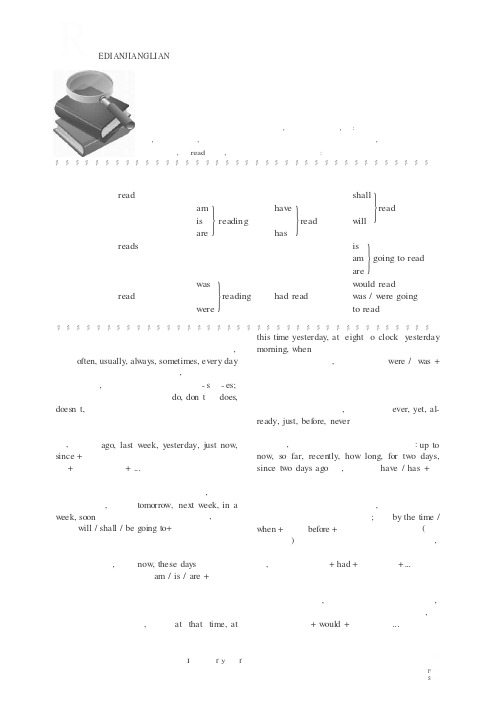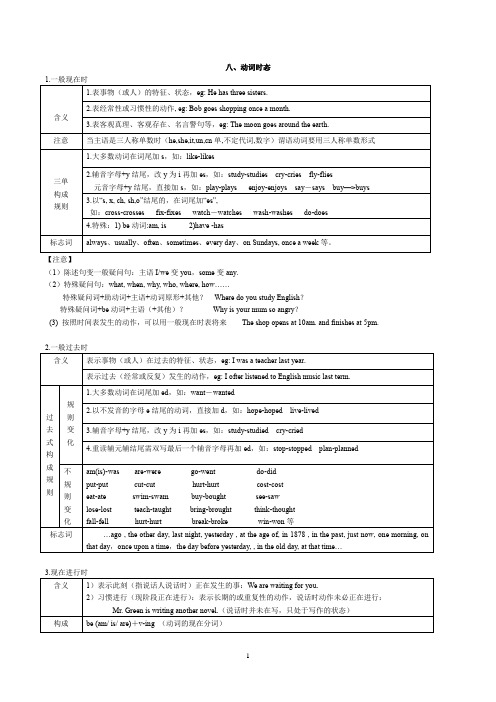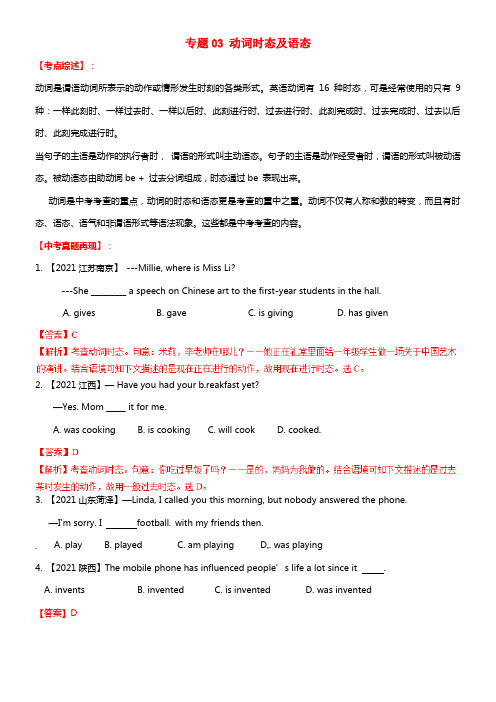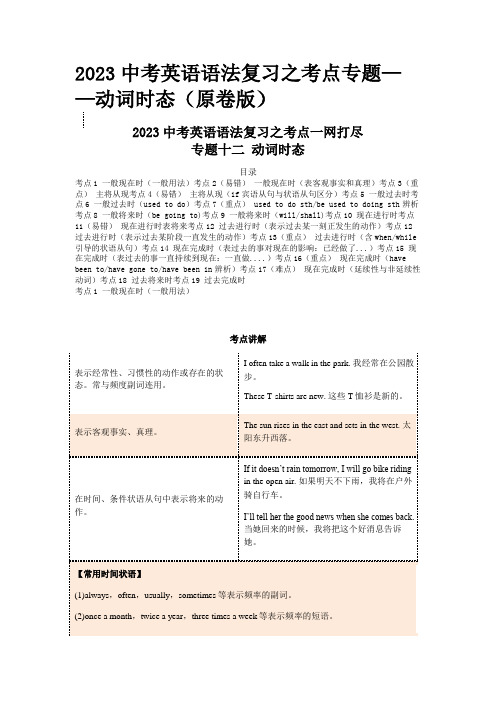中考总复习动词时态
中考英语总复习动词时态归纳总结

一般 时态 read 现
在 reads
过 read
去
进 行进 态
}am
is reading are
完 成时 态
}have read has
}was reading were
had read
将 来时 态
}shall read will
人称单数时, 实义谓语动词应在其后加- s 或- es;
六、现在完成时
构成疑问 句或否 定句时借 助 do, don’t 或 does,
现 在完成 时指过去 发生的 某一动作 对现
doesn’t, 谓语动词应用原形。
在 造成的影响 或结果, 此 时常与 ever, yet, al-
二、一般过去时
ready, just, before, never 等 时间状 语连 用。也
一般现在时表示经常性或习惯性的动作, morning, when 引导的 时间 状语从 句等表 示过
常与 often, usually, always, sometimes, every day 去的 时间状语连用, 谓语动 词由“were / was +
等时间状语连用。一般现在时中, 当主语是第三 现在分词”构成。
语 + 动词过去式 + ...”。
中考英语专题 --八种常见动词时态讲解(共49张PPT)

二、一般过去时
1.一般过去时的结构:
主语+动词过去式+其它
I did my homework yesterday.
(did就是do的过去式) 否定构成:didn’t+动原 一般疑问构成及简答举例:Did+主语+动原+其它? 特殊疑问句举例:What did he do yesterday? When did he get up this morning?
火车明天上午六点开。
6)在复合句中,当主句是一般将来时,时间状语 从句或条件状语从句的谓语动词只能用一般现在 时来表示将来。 例如: I'll tell him the news when he comes back. 他 回来时,我将告诉他这个消息。
If you take the job , they will talk with you in greater details. 如果你接受这份工作,他们将和你谈谈细节。
I do my homework every day.
1.改为一般疑问句并回答。 Do you do your homework every day? Yes, I do./No, I don't. 2.改为否定句。 I don't do my homework every day.
Jim does his homework every day. 1.改为一般疑问句并回答。 Does Jim do his homework every day? Yes, he does./No, he doesn't. 2.改为否定句。 Jim doesn't do his homework every day.
中考英语语法:动词时态

动词时态●动词时态●一般现在时【形式】I / We / You / They doHe / She / It does【意义】【功能】1.表示经常性的动作或状态e.g. I live in Shanghai.2.表示习惯性的动作或状态e.g. He always drink coffee in the morning.3.表示客观真理e.g. The sun rises in the east.【常见关键词】频度副词: always, usually, often, sometimes, seldom, rarely, never 表示频率的短语: once a week, twice a year, every day, every week●现在进行时【形式】I am doingWe / You / They are doingHe / She / It is doing【意义】【功能】1.表示现在正在进行或现阶段正在进行的动作e.g. I'm learning English with Fiona.I am reading this book these days.【常见关键词】now, at present, at the moment, for the time beinglook, listen, be careful【辨析】一般现在时vs现在进行时一般现在时:强调过去现在将来都如此的一贯性现在进行时:强调动作的暂时性(目前如此)I don't really work here. I ______ until the new secretary arrives.A) just help outB) have just helped outC) am just helping outD) will just help out●现在完成时【形式】I / We / You / They have doneHe / She / It has done【意义】【功能】1.动作从过去开始一直持续到现在,现在仍在进行并还有可能延续下去e.g. We have known each other for 7 years since I moved here.2.动作在过去完成,并对现在产生影响,影响一直持续到现在e.g. Where have you put the book? I can't see it anywhere.【常见关键词】Already(用于肯定句中), yet(用于否定句和疑问句中), just, since(自从), for+一段时间, recently, ever, never, by now, so far, in the past few years, in the last ten weeks注意:1)在完成时句中,与for, since, how long连用时,动词要用延续形式。
2023年英语中考语法总复习—8.动词时态和语态

八、动词时态【注意】(1)陈述句变一般疑问句:主语I/we变you,some变any.(2)特殊疑问句:what, when, why, who, where, how……特殊疑问词+助动词+主语+动词原形+其他?Where do you study English?特殊疑问词+be动词+主语(+其他)?Why is your mum so angry?(3) 按照时间表发生的动作,可以用一般现在时表将来The shop opens at 10am. and finishes at 5pm.【注意】(1)always也可用于现在进行时,表示一种强烈的感情色彩,译为“总是”He is always telling lies.(2)某些特殊动词不能用于现在进行时。
① have当“有”讲时,不能用现在进行时。
I have two books now.②“belong to” The two people belong to me now.③表示“心理活动/状态/感觉”的词I want a dog now.① be going to主要用于:主观判断(1)表示事先经过考虑、安排好打算要做的事情:I’m going to play the violin.(2)表示根据目前某种迹象判断,某事非常有可能发生(有迹象表明要发生的事)。
Look!There come the dark clouds. It is going to rain.② will主要用于:(1)客观上将来势必发生的事情, 未经事先考虑, 临时决定的They will go to visit the factory tomorrow.(2)表示不以人的意志为转移的自然发展的未来的事:Today is Saturday. Tomorrow will be Sunday.(3)表意愿。
问对方是否愿意做某事或表示客气地邀请或命令:Will you please turn on the radio?(1) have/has been to “去过已回”She has been to Japan twice.have/has gone to. “去了未回”Where is your twin sister? She has gone to Japan.have/has been in “待在某地” She has been in Japan for 2 years. (2) 动词从词义上可以分为延续性和非延续性两种。
中考英语备考 专题03 动词时态及语态(含解析)

专题03 动词时态及语态【考点综述】:动词是谓语动词所表示的动作或情形发生时刻的各类形式。
英语动词有16种时态,可是经常使用的只有9种:一样此刻时、一样过去时、一样以后时、此刻进行时、过去进行时、此刻完成时、过去完成时、过去以后时、此刻完成进行时。
当句子的主语是动作的执行者时,谓语的形式叫主动语态。
句子的主语是动作经受者时,谓语的形式叫被动语态。
被动语态由助动词be + 过去分词组成,时态通过be 表现出来。
动词是中考考查的重点,动词的时态和语态更是考查的重中之重。
动词不仅有人称和数的转变,而且有时态、语态、语气和非谓语形式等语法现象。
这些都是中考考查的内容。
【中考真题再现】:1. 【2021江苏南京】---Millie, where is Miss Li?---She _________ a speech on Chinese art to the first-year students in the hall.A. givesB. gaveC. is givingD. has given2. 【2021江西】— Have you had your b reakfast yet?—Yes. Mom _____ it for me.A. was cookingB. is cookingC. will cookD. cooked3. 【2021山东菏泽】—Linda, I called you this morning, but nobody answered the phone.—I'm sorry. I football with my friends then.A. playB. playedC. am playingD. was playing4. 【2021陕西】The mobile phone has influenced people’s life a lot since it .A. inventsB. inventedC. is inventedD. was invented【答案】D【解析】考查动词时态及语态。
2024年中考复习时态专项(课件)

五、【过去进行时】
试卷讲评课件
1.结构:主语+be(was/were)+doing(动词的现在分词形式) 2.定义: (1)过去某一时刻或阶段正在进行的动作 They were swimming at 3:00pm yesterday. (2)表示一个动作发生时另一个动作正在进行,常与when.while等引导时 间状语的词连用 I was doing my homework while my mom is cooking. 3.时间状语:at the time of… 在…的时候 at this/that time 在这时/在那 时/ at +点钟+过去的时间.when.while等引导过去时间状语的从句
一Oh! It ________ (leave )some sweet memories in my heart in the past several months. 17.—Is Helen here?一No, she isn't here. She ________ (arrive) in half an hour.
2023中考英语语法复习之考点专题——动词时态(原卷版)

2023中考英语语法复习之考点专题——动词时态(原卷版)2023中考英语语法复习之考点一网打尽专题十二动词时态目录考点1 一般现在时(一般用法)考点2(易错)一般现在时(表客观事实和真理)考点3(重点)主将从现考点4(易错)主将从现(if宾语从句与状语从句区分)考点5 一般过去时考点6 一般过去时(used to do)考点7(重点) used to do sth/be used to doing sth辨析考点8 一般将来时(be going to)考点9 一般将来时(will/shall)考点10 现在进行时考点11(易错)现在进行时表将来考点12 过去进行时(表示过去某一刻正发生的动作)考点12 过去进行时(表示过去某阶段一直发生的动作)考点13(重点)过去进行时(含when/while 引导的状语从句)考点14 现在完成时(表过去的事对现在的影响:已经做了...)考点15 现在完成时(表过去的事一直持续到现在:一直做....)考点16(重点)现在完成时(have been to/have gone to/have been in辨析)考点17(难点)现在完成时(延续性与非延续性动词)考点18 过去将来时考点19 过去完成时考点1 一般现在时(一般用法)考点讲解1.(2021·上海松江·二模)Tim likes watching films. He _________ to the cinema with his girlfriend once a week.A.goes B.is going C.has gone D.will go2.(2020·湖北恩施)I hear that it often ________ in Sichuan and there are usually floods, especially in summer.A.rains B.rained C.will rain3.(2021·北京房山·二模)Mary ________ her grandparents every weekend.A.visits B.was visiting C.is visiting D.has visited4.(2021·广西桂林)The zebra eats grass, but it ________ eat meat.A.doesn’t B.didn’t C.don’t5.(2021·黑龙江·齐齐哈尔市碾子山区教师进修学校一模)—Do you like the flower? —Yes. It ________ sweet.A.is smelling B.smells C.smelt考点2(易错)一般现在时(表客观事实和真理)考点讲解精选练习6.(2020·天津红桥·二模)In the past, people didn't know the earth ________round the sun. A.going B.goes C.will go D.go7.(2021·吉林长春·模拟预测)The teacher told us that the sun ________ in the east. A.rises B.rise C.rose D.rising考点3(重点)主将从现考点讲解精选练习8.(2021·四川乐山)—What’s your plan for the summer holiday?—I’ll go to Chendu as soon as the school term ___________.A.end B.ends C.will end9.(2021·广西河池)Mrs. Green will take her son to the amusement park if she ________ the tickets.A.got B.gets C.is getting D.will get10.(2021·辽宁丹东)We can’t avoid traffic accidents unless everyone ________ the rules. A.follows B.breaks C.will follow D.will break考点4(易错)主将从现(if宾语从句与状语从句区分)考点讲解精选练习11.(2021·辽宁鞍山)—Tina wants to know if you ________ to the park with us tomorrow. —I’d love to. But if it ________, I may go to the library instead.A.go; will rain B.go; rains C.will go; rains D.will go; will rain12.(2020·黑龙江牡丹江)—I wonder if we ________a farewell party next week. —If we________it, I will call you.A.will have ; have B.have;will have C.will have; will have13.(2021·黑龙江哈尔滨)—I wonder if you ________ us for the English party tomorrow. —If I ________ free, I will go with you.A.will join, am B.will join, will be C.join, am考点5 一般过去时考点讲解精选练习14.(2021·广西贵港)—Where does Bill live? —He ________ me his address, but I can’t remember it now.A.tells B.told C.is telling D.will tell15.(2021·四川达州)— Alice has gone out. — Oh, has she? What time ________ she________?A.has; gone B.will; go C.did; go D.is; going16.(2021·江苏徐州)In my school days, I ________ a lot of reading in English every day. That was how I learned English at that time.A.do B.did C.have done D.will do17.(2021·重庆)Last Sunday my brother and I ________ our grandparents.A.will visit B.visits C.visit D.visited18.(2021·内蒙古兴安盟)— Have you ever been to Shanghai? — Of course. Actually, I________ there for six years, but now I live in Beijing.A.worked B.was working C.would work D.have worked考点6 一般过去时(used to do)考点讲解精选练习19.Mr Jiang isn’t as busy as before because there ___________no home robot to help him.A.used to be B.may be C.used to have D.may have20.I ________ in this small mountain village when I was a child.A.use to live B.used to living C.used to live D.used to life21.(2019·江苏镇江)Yao Ming, a basketball giant , ___________ water polo when he was young.A.is playing B.used to play C.is used to playing D.was playing考点7(重点) used to do sth/be used to doing sth辨析考点讲解精选练习22.(2020·湖南益阳)Diana used to _________ to work, but now she is used to ________ because the road is crowded and she wants to keep fit.A.drive; walk B.drive; walking C.driving; walk23.Dick __________ in America, but he has been ___________ Chinese food since he moved to China.A.used to live; used to eating B.is used to live; used to eat C.is used to live; used to eating D.used to living; used to eat24.—How does your brother go to school? —He ___________ ride a bike, but now he__________ there to keep fit.A.used to; is used to walk B.used to; is used for walking C.was used to; is used to walking D.used to; is used to walking考点8 一般将来时(be going to)考点讲解一般将来时表示将来某个时间要发生的动作,事情或存在的状态,也表示将来经常或反复发生的动作或事情。
(人教版)中考英语总复习语法:专题8-动词的时态、语态(101页)

(2)过去完成时与现在完成时的主要区别是时间参 照点不同: 过去完成时的时间参照点是某个“过去的” 时间;现在完成时的时间参照点是“现在”。因此现在 完成时中的很多规则,也适用于过去完成时。 When I got to the cinema, the film had been on. 当我到达电影院时,电影已经开始了。
以辅音字母+y结尾的动词, 把y变为i再加-ed
以一个元音字母加一个辅音 字母结尾的重读闭音节词, 双写结尾字母再加-ed
study→studied carry→carried stop→stopped drop→dropped prefer→preferred
3.一般将来时 (1)表示将来某个时间要发生的动作或存在的状 态,其构成形式:“will/shall+动词原形”。常与表 示将来的时间状语tomorrow,next week,in+一段时 间等连用。 当主语是第一人称I或we时,问句中一般用shall。
③表单纯性的将来,与人的主观愿望和判断无关 时。 If it's made of wood, it will float on water. 这要是木材做的,它能浮在水面上。 (4)当主句为一般将来时态时,在if,as soon as, until, when等引导的状语从句中用一般现在时代替一 般将来时。 I will call you as soon as I get there. 我一到那儿就给你打电话。
特殊情况:have→has,am/are→is 考查热点:如果主句为一般将来时,if,unless等 引导的条件状语从句和when,until,as soon as等引导 的时间状语从句常用一般现在时表示将来。 What about going climbing if it doesn't rain tomorrow? 如果明天不下雨,去爬山怎么样?
- 1、下载文档前请自行甄别文档内容的完整性,平台不提供额外的编辑、内容补充、找答案等附加服务。
- 2、"仅部分预览"的文档,不可在线预览部分如存在完整性等问题,可反馈申请退款(可完整预览的文档不适用该条件!)。
- 3、如文档侵犯您的权益,请联系客服反馈,我们会尽快为您处理(人工客服工作时间:9:00-18:30)。
动词时态一、一般现在时:1.表示习惯性、经常性发生的动作或存在的状态。
2.谓语:主语是单三,谓语就是单三(常加s/es);主语是其它,谓语为原形。
改为一般疑问句时,需在句首用助动词Do / Does,然后动词转换为原形;改为否定句时在主语后加don't / doesn't,动词用原形. (be动词除外)3.动词单数第三人称构成方式:①一般在词尾后加s。
例如:play---plays enjoy---enjoys buy---buys ②以s,sh, ch , o结尾的加es. 例如: pass / wash / brush / teach / watch / go / do. ③以辅音字母加y结尾的,变y为i,在加es.例如:study / worry / fly ...④特殊情况: be---is have ---has4.常与often / usually / never / sometimes / always / seldom / on Sundays / everyday/ once a week等时间状语连用。
5主将从现,if / as soon as / when等引导的状语从句或表示普遍真理、客观存在的句子中。
A.用所给动词的正确形式填空。
1. We'll stay at home if it ________(rain) tomorrow.2.I'll tell him the news as soon as he _____(come) back.3.Don't get off the bus until it_______(stop).4.The teacher told us that the earth_____(go) around the sun.B.选择填空2.The children will climb the hill if it ____ tomorrow.A. won't rainB. didn't rainC. doesn't rainD. isn't raining3. ---I’m sorry that John is out.---Please ask him to call me as soon as he _______.A. comeesC. cameD. will come7.I wonder if it will rain tomorrow.A. want to knowB. don't knowC. thinkD. ask8.Why don't you go with me ?A. Why not to goB. Why not goingC. Why not goD. Why go9. The boy is able to draw a nice cat in five minutes.A. mayB. canC. willD. mustD.句型转换1.He does his homework at home every evening.(否定句)He ____ ____ his homework at home every evening.2. Jim has lunch at home every day.(一般疑问句)______Jim _____lunch at home every day?3. He has no brothers or sisters.(同义句)He _____ ______any brothers or sisters.5. He has no money with him, __________?(反意疑问句)6. I think he is right.(否定句)I ______ think he _____ right.二、现在进行时:1.表示正在进行或发生的动作。
2.谓语构成是:be+动词的ing形式。
3.动词的ing构成方式有以下几种:①一般在词尾后加ing。
例如:play / sleep / go ...②以e结尾的取e,再加ing。
例如:leave / make / have ...③重读闭音节词,先双写结尾辅音字母,再加ing。
例如:forget / swim / run / begin ...④ie结尾的变ie为y,再加ing。
例如:lie / tie / die4.当句中出现"Look ! " ; " Listen !" ; "Don't make any noise !"等时,多与进行时连用。
5. 表示反复出现的动作,常表示说话人的某种感情如赞扬、厌烦等,常和always连用。
①Mr. Green is very kind, he is always thinking of others.②When Edison was young, he was always asking so many strange questions.6.表示位置移动的词,如go , come , leave , arrive等常用进行时表示将来,一般同表将来的时间状语连用。
①---Where are you going? ---To the shop.②---When are you leaving for Beijing? ---Sometime next week.③---Supper is ready, Linda!---Oh, I'm coming.7. Here /there 开头时,常用一般现在时,表示正在进行。
如:Look! Here comes the school bus. Listen! There goes the bell.A.填空1. Look! The boys ___________ (play) football on the playground.2. It's Seven o'clock now . The Smiths _________(have) breakfast.3. Don't make any noise ! Your father ________(sleep).4.Be quiet ! The students of Class 2 ________(have) an English class.5. Look! There is a pet dog ____(躺) on the ground. Let’s go and play with it.B.选择填空( )1.---Peter , could you come and help me in the kitchen, please?---Sorry, mum, I ____Lily with her English.A. helpB. helpedC. have helpedD. am helping( )2.---Excuse me, where is Lily? ---Oh, she ___the volleyball match on the playground.A. watchesB. will watchC. is watchingD. watched( )3.Look! here ______the bus!A. comeB. comingC. to comeD. comes三、一般过去时1.表示过去某个时间发生的动作或存在的状态。
变为疑问句时,需在句首用助动词Did,然后动词转换为原形;改为否定句时,在主语后加didn't,然后动词转换为原形。
(be动词除外).2.常与yesterday / just now / last year / in 1964 / three days ago连用或since引导的从句。
3.行为动词的过去式构成方式:①一般在词尾加ed。
如:help---helped②以e结尾的加d。
如:like---liked③重读闭音节词,先双写结尾辅音字母再加ed。
如:stop---stopped travel---travelled shop---shopped plan---planned ④以辅音字母加y结尾的,变y 为i,再ed.如:carry---carried study---studied worry---worried hurry---hurried4.常用不规则行为动词的过去式:A.填空:1. It's a long time since we ______(meet) last.2. ---____you ____(have) a good time last night? ---Yes, thanks.3.---Have you ever been to the Great Wall before? ---Yes, I ______(go) there last spring.4.---When ______you ______(find) your lost bike? ---Half an hour ago.5. His parents ______(die) two years ago. Now he lives alone.四、一般将来时1.表示将来某一时间要发生的动作或存在的状态,2.谓语构成:will+动词原形或be going to +动词原形。
一般疑问句常提前Will,如果主语为第一人称时,需提前Shall,否定句will+not,缩写为won't.3.常与tomorrow / next week / this evening / in three days / sometime next week等时间状语连用。
注意:①在问对方是否愿意,或表示客气的邀请或命令时,常用Will you please (not) do sth?,回答时应为:Yes,I will / No, I won't.②There be 的将来时为:There will be... / There is (are)going to be.A.选择填空( )1.---Why are you in such a hurry, Mike? ---There___an NBA basketball match in ten minutes.A. will haveB. are going to beC. will beD. is going to have2.I don't know if it ______ tomorrow. If it ______, I'll stay at home.A. rains ; rainsB. will rain ; will rainC. rains ; will rainD. will rain; rains3.---Jim ,can you help me to wash the dishes ? ---Sorry, Dad. I _______to the shop.A. goB. wentC. am goingD.have gone4.---Will you please ______with fire? ---Sorry, I won’t.A. don’t playB.not playC.not to playD. not playing5. ---Don’t play football in the street. ---_______.A.I won’tB. I mustn’tC.I can’tD. I don’t6. ---How soon _____your father ______back home? ---In half an hour.A. did ; comeB. will ; comeC.are ; comingD. has ; come五、过去进行时1.表示在过去某一时刻或某一段时间正在进行的动作.2.谓语构成:was / were+动词的现在分词。
